高职高专英语I Unit 4教案
中职英语基础模块一Unit4完整教案

Unit4 Would You Like to Go Shopping with Me? 课题:Would you like to go shopping with me?课时:6学时授课人:张燕凌教学目标1.谈论服装(颜色、尺寸、喜欢和不喜欢)2.谈论要求服务或向别人提供服务。
3.掌握金钱数额的表达方法。
4.掌握形容词和副词的三个等级5.掌握元音的正确发音方法教学难点难点谈论服装(颜色、尺寸喜欢和不喜欢) 掌握金钱数额的表达方法购物时的简单对话语言目标能用下列交际用语进行简短对话Do you want a jacket?Yes,I do.Do you want a white jacket? No,I don’t.I want a blue one Here is a nice blue jacket语言结构形容词和副词的三种形式难点词汇enough, money, want, enjoy, change, different, opinion, towards, allow, without, other, service教学重点:学会简单的购物交际用语教学方法:讲解法、提问法、分析法、角色扮演法教学过程:角色扮演(ROLE PLAY)1.教师可根据初中学过的知识丰富谈话的内容,例如A: May I help you?B: Yes, please. These shoes are too smallA: Oh,I’m sorry. Do you have the receipt?B: No,I’m sorry. It’s at homeA: I need a shirt, pleaseB: Ok.What size?A: Small. And do you have this jacket in medium?B: Yes, I think so2.明确口语活动的任务,要求学生仔细阅读图片。
《英语1》(基础模块高教版)教案:第四单元第四课时(中职教育).docx
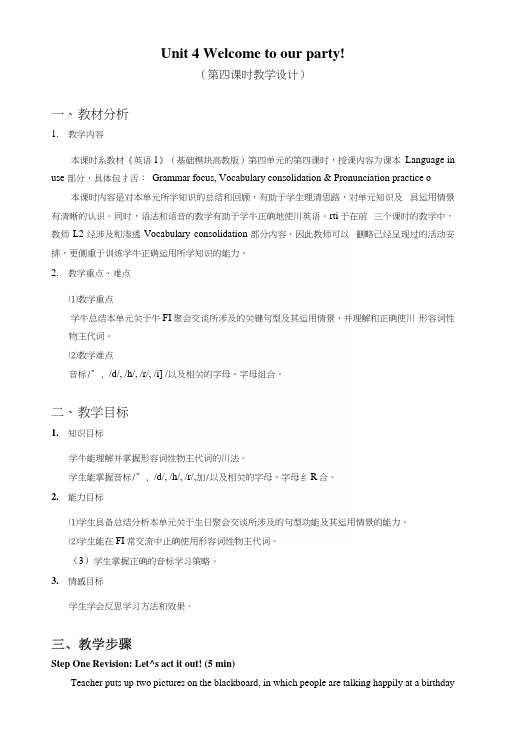
Unit 4 Welcome to our party!(第四课时教学设计)一、教材分析1.教学内容本课时系教材《英语1》(基础模块高教版)第四单元的第四课时,授课内容为课本Language in use 部分,具体包扌舌:Grammar focus, Vocabulary consolidation & Pronunciation practice o 本课时内容是对本单元所学知识的总结和回顾,有助于学生理清思路,对单元知识及具运用情景有清晰的认识。
同时,语法和语音的教学有助于学牛正确地使川英语。
rti于在前三个课时的教学中,教师L2经涉及和渗透Vocabulary consolidation部分内容,因此教师可以删略己经呈现过的活动安排,更侧重于训练学牛正确运用所学知识的能力。
2.教学重点、难点⑴教学重点学牛总结本单元关于牛FI聚会交谈所涉及的关键句型及其运用情景,并理解和正确使川形容词性物主代词。
⑵教学难点音标/”, /d/, /h/, /r/, /i] /以及相关的字母、字母组合。
二、教学目标1.知识目标学牛能理解并掌握形容词性物主代词的川法。
学生能掌握音标/”, /d/, /h/, /r/,加/以及相关的字母、字母纟R合。
2.能力目标⑴学生具备总结分析本单元关于生日聚会交谈所涉及的句型功能及其运用情景的能力。
⑵学生能在FI常交流中止确使用形容词性物主代词。
(3)学生掌握正确的音标学习策略。
3.情感目标学生学会反思学习方法和效果。
Step One Revision: Let^s act it out! (5 min)Teacher puts up two pictures on the blackboard, in which people are talking happily at a birthdayparty. Students look at it, think about what they are talking, and add dialogues for thepeople with group members togethe匚Then students act the dialogue out in a group with 4 members. After 5 minutes9 preparation, they perform it on the stage・ The best performer is praised by teacher orally.(设计意图:该步骤有助于学生对本单元知识进行回顾和复习,并在真实情景中运用。
职高英语第一册unit4教案.doc
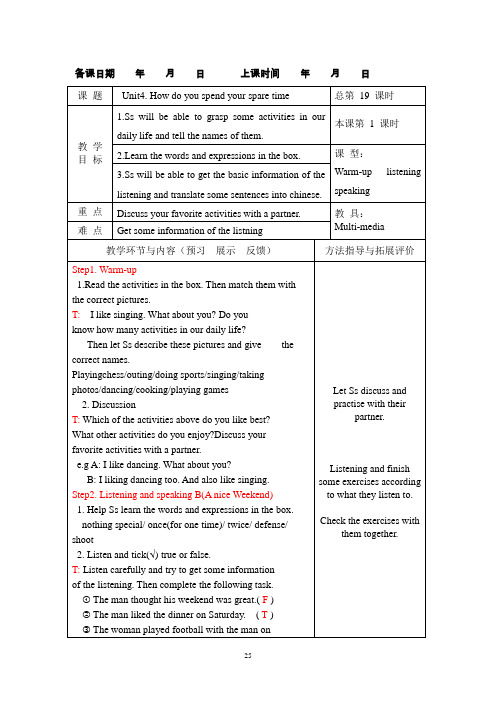
备课日期年月日上课时间年月日课题Unit4. How do you spend your spare time 总第19 课时教学目标1.Ss will be able to grasp some activities in ourdaily life and tell the names of them.本课第 1 课时2.Learn the words and expressions in the box. 课型:Warm-up listeningspeaking3.Ss will be able to get the basic information of thelistening and translate some sentences into chinese.重点Discuss your favorite activities with a partner. 教具:Multi-media难点Get some information of the listning教学环节与内容(预习展示反馈)方法指导与拓展评价Step1. Warm-up1.Read the activities in the box. Then match them withthe correct pictures.T:I like singing. What about you? Do youknow how many activities in our daily life?Then let Ss describe these pictures and give thecorrect names.Playingchess/outing/doing sports/singing/takingphotos/dancing/cooking/playing games2. DiscussionT: Which of the activities above do you like best? What other activities do you enjoy?Discuss your favorite activities with a partner.e.g A: I like dancing. What about you?B: I liking dancing too. And also like singing. Step2. Listening and speaking B(A nice Weekend)1. Help Ss learn the words and expressions in the box. nothing special/ once(for one time)/ twice/ defense/ shoot2. Listen and tick(√) true or false.T: Listen carefully and try to get some informationof the listening. Then complete the following task.① The man thought his weekend was great.( F )② The man liked the dinner on Saturday. ( T )③ The woman played football with the man onSunday ( F )Let Ss discuss andpractise with theirpartner.Listening and finish some exercises according to what they listen to. Check the exercises with them together.④The woman knew that the man is a good footballplayer. ( F )3. Listen again and complete the sentences.Let Ss listen to the tape of the listening . Then repeat afterthe tape . Last, check their answerswith the whole class.① Year, it was OK. _____________really.② I went to a friend's _____on Saturday.③ I didn't know you played football. _______________do you play?④ So are you _______________?Step3. Learn by doing1. Ask each other about your abilities in sports,etc. , using Are you any good?Then explain yourAnswers.2. Ask two classmates about their spare-timeActivities:what do they for fun and how often do they dothem?Then complete the chart and share your answers withthe class.Step4. Homework1.Review some words again.2.Prepare for new lesson.教学反思备课日期年月日上课时间年月日课题Unit4. How do you spend your spare time 总第20 课时教学目标1.Ss will be able to grasp some key sentences of thelistening and use them to communicate with eachother.本课第 2 课时2.Ss will be able to read the dialoge fluently课型:ListeningSpeaking Reading 3.Ss can grasp the main idea of the passageby reading fast.重点Reading comprehension 教具:难点Use the expressions to talk about hobbies Multi-media 教学环节与内容(预习展示反馈)方法指导与拓展评价Step1.What is your hobby?1. ListeningT: What does Billy like to do in his spare time?Make your guess. Then listen to the dialogue to checkyour prediction.Play the tape of the conversation for Ss to listen. Thenlook at the following pictures and tick(√)2. Repeat and underlineT: listen again. Then underline the questions about hobbies in the conversation and try to repeat after it.3.practice① Use the expressions you've learned to talk about hobbies with your partner. Then completethe chart with the information you get.Your partner's hobbies How long has he/shebeen interested in it?②Work in pairs and complete the conversationon P58.Step2. Reading comprehension1.Fast reading.①Look at the picture in the passage. Guess what Mary's hobby is.Then scan the passage to checkyour prediction.②Reading again and answer: how does Mary plant her flowers? Put the following pictures inOrder.(on P62)2.Reading carefully.Read the passage again and circle the correct answer.①Every year, Mary plants her flowers in _. ( b)Help them understand thelistening . Talking with their partner use the expressions with the help the teacher.Reading the passage with the teacher's help.Do these exercises according to the passage,then checkwith the whole class.a. winterb. springc.summer②What does Mary like most? ( b)a. Roses.b. Lilies.c. Cucumbers.③What does Mary do with her flowers? (c)a.She makes salads with them.b.She gives them to friends in the dancing class.c.She wears them in her hair.Step3.homework 1.read the passage again.2.Try to find out some key points教学反思备课日期年月日上课时间年月日课题Unit4. How do you spend your spare time 总第21 课时教学目标1. Ss will be able to understand the passage andread fluently.本课第 3 课时2.Most of the students can complete some exercisesaccording to this passage. 课型:Reading& writing 3. Ss will be able to master some language points inthe passage.重点Read fluently and complete exercises 教具:Multi-functionalteaching equipment(CAI)难点Some language points in the text教学环节与内容(预习展示反馈)方法指导与拓展评价Step1. Warm-upChecking some new words in the passagee.g garden/pot/even/inside/beginning/hang/outside/rose/crazy/worth/penny/in full bloom/sightStep2. Reading and analysing the passage1. Read the following paragraph. Circle the connecting words "and", "but" and "or" , and underline the ideasFirst , let then try doing , then check it with the wholeclass.They need more exercises toimprove.that each connecting word links.(Mary loves planting flowers and vegetables. Her house is small but her garden is really big.Every year , Mary starts plants in April or earlyMay. She spends a lot of money on her garden ,but she thinks it is worth every penny.)2. Language points① Every year in early spring, she begins by planting flowers in small pots (that she keeps near a window. ) The attributive clause(让学生找出本文所有的定语从句)② once "一旦"e.g Once you understand this rule, you will have no further difficulty.Once you have decide to do something, you should do it well.③ move into : to come or go intoe.g I moved into a new house last week.3. Complete the following paragraph. Use the connecting words to combine the details.(on P63)Step 3. Homework1. read the passage again2. Do some exercises on exercise book .教学反思备课日期年月日上课时间年月日课题Unit4. (Further reading ) 总第22 课时教学目标1.Ss will be able to read the passage by themselvesand understand it.本课第 4 课时2.They can complete some exercises. 课型:Further reading重点Reading skills 教具:Exercise book 难点Writing skills教学环节与内容(预习展示反馈)方法指导与拓展评价Step1Further readingHave Ss read the article on P71 twice, and have adiscussion.①What’s the differences among the school clubs in the US?②What clubs does your school have?③Are you a member of any of them?Step2 exercise book on p311.Read the passage and write Women or Men in the blanks.①____Clothes shops, clothes shops, more clothes shops.②_____Clothes shops, electronics shops, music shops. How long do they spend shopping?Discuss in pairs.Let Ss do it by themselves.Check by themselves. then the teacher check their answers again.①____ An hour, possibly two.②_____A day.What do they love?①____They love looking at everything, trying onclothes,and talking to the shop assistants......②____They love getting home! They love trying ontheir new clothes and plying with their new "toys".What do their hate?①_____They hate waiting for woman to decide whatthey want. They hate asking shop assistants for help.②_____They hate hearing"Can we go home now? Thefootball starts in half an hour."2.Read the passage and fill in the chart. (on P32)3.Read the report result of the top ten free-timeactivities in a city. Use and, but,and or to explain theresult.The Top Ten Free-time Activities in the city____________________________________________________________________________教学反思备课日期年月日上课时间年月日课题Unit4.How do you spend your spare time 总第23 课时(Real Life Skill)教学目标Ss will be able to make a weekly plan for the clubactivities.本课第 5 课时Ss will be able to join the group work friendly. 课型:Real Life Skill重点Real life skills 教具:难点Group work教学环节与内容(预习展示反馈)方法指导与拓展评价Step1. Real life skills1. Practise on P68 .(let students look at pictures anddiscuss.)Your friends invite you to join one of the followingschool clubs. Think carefully and decide which clubyou want to join.Cards club/ music club/ art club/ computer club/ bookclub/ sports club2.Now work with the classmates who have chosen thesame club as you do, and make a weekly plan for the club activities.Dancing clubTime Activities Places Monday Practice Classroom314 Wednesday Practice Classroom314 Saturday Ball Dining hall Sunday Disco party Sports field3.Report your plan to the class.ExampleThere are_____people in our club. We plan to do the following every week: on Monday, weshall________________________________________ ____________________________________________ _______;on_______________Step2. HomeworkPractise making a weekly plan for the club activities. let students look at pictures and discuss.Writing by themselves教学反思备课日期年月日上课时间年月日课题Unit4.How do you spend your spare time( Language in use)总第24 课时教学目标1.Ss will be able to read phonetics 本课第6 课时2.They can master the use of the adverb 课型:Language in use 3.V ocabulary重点The use of the adverb 教具:Multi-functionalteaching equipment(CAI)难点Deal with some exercises教学环节与内容(预习展示反馈)方法指导与拓展评价Language in useStep1. phonetics1. Listen and read the following vowels and words./ei/ /ai/ /ɔi/game cake drive light toilet toy2. Listen to the words in the box. Then group themaccording to their pronunciation.train/ toy/ kite/ plane/ light/ lion/ coin/ rice/ cake/ boy/ table/ tiger/Step2. GrammarAdverbs of Frequency and Time Expressions(on P65)Exercises: Listen to the vowels and words ,then repeat after it.1. Complete the conversations with adverbs offrequency.① A: Do you feel tired?B: Yes, I___feel tired! There is so muchhomework to do!② A: Do you drink coffee?B: I___drink coffee, but I usually drink tea.③ A: Do you like steak?B: Actually,I__eat steaks. I can't stand theSmell.2.Ask and answer questions about Lisa's weeklyschedule below. (on P66)Step3. V ocabulary1. let Ss write down the right color for eachballoon below.2. Complete the sentences with the correctwords from the box. Change the form ifNecessary.(on P67)Step4. HomeworkDo exercises book on P31教学反思备课日期年月日上课时间年月日课题Unit4 Revision 总第25 课时教学目标Revise some words and phrases 本课第7 课时Reading &Grammar&Writing 课型:Revision Do some exercises重点Do some exercises 教具:Exercise book 难点Do some exercises教学环节与内容(预习展示反馈)方法指导与拓展评价Step1. Words & phrases1.In this unit you have learned these words.spare/since/nothing/once/twice/quite/terrible/shoot/garden/pot/even/inside/beginning/hang/outside/rose/crazy/worth/penny/full/sight/purple/fall/own/if/nothing special/worth every penny/infull bloomStep2.Reading and talkingLet Ss talk about spare-time activities and do someexercises on P32-33(exercise book)Step3.GrammarRevise the grammar and do some exercises教学反思35。
中职基础英语第一册 Unit4教案
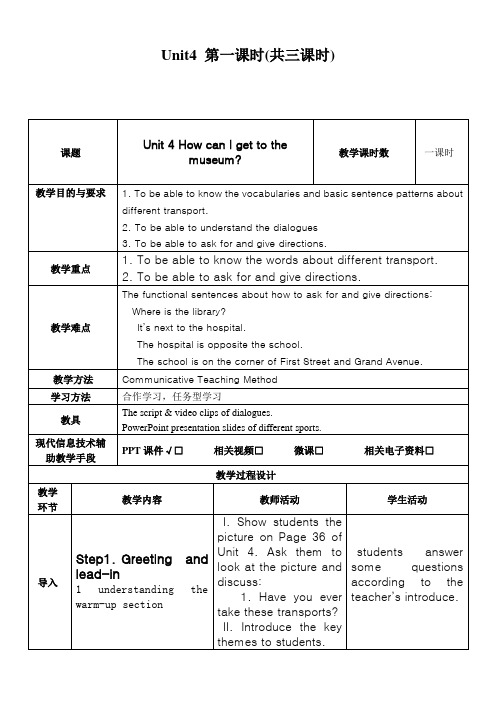
III. Play the tape twice and ask the students to practice it after the tape.
Studentsanswerto teacher’s question
新
课
教
学
过
程
新
课
教
学
过
程
Step 2.Pre-reading1. Get students tounderstand some key words in the passage
Step 3.Readingpractice (1)
I. Present some new words on the slide. Tell students their meanings and pronunciations.
II. Present the following sentences and ask students to read. Explain the meaning of the sentence pattern:
How can I get to the hospital?
Go three blocks,
现代信息技术辅助教学手段
PPT课件√□相关视频□微课□相关电子资料□
教学过程设计
教学环节
教学内容
教师活动
学生活动
导入
Step1. Greeting and lead-in
英语1 基础模块 unit4 School life 教案
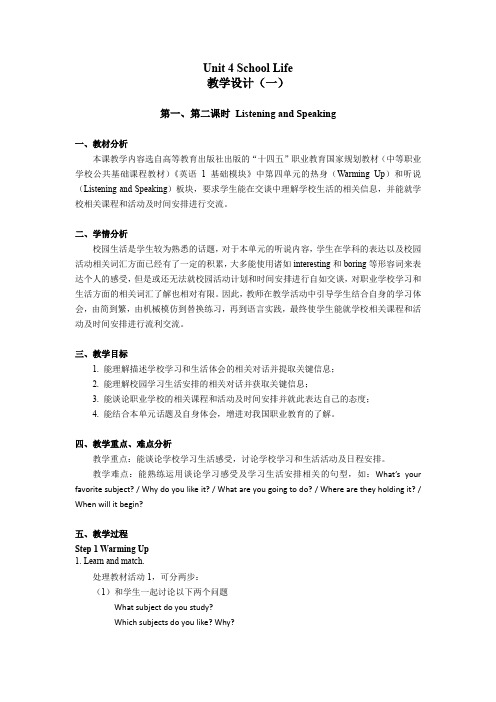
Unit 4 School Life教学设计(一)第一、第二课时Listening and Speaking一、教材分析本课教学内容选自高等教育出版社出版的“十四五”职业教育国家规划教材(中等职业学校公共基础课程教材)《英语 1 基础模块》中第四单元的热身(Warming Up)和听说(Listening and Speaking)板块,要求学生能在交谈中理解学校生活的相关信息,并能就学校相关课程和活动及时间安排进行交流。
二、学情分析校园生活是学生较为熟悉的话题,对于本单元的听说内容,学生在学科的表达以及校园活动相关词汇方面已经有了一定的积累,大多能使用诸如interesting和boring等形容词来表达个人的感受,但是或还无法就校园活动计划和时间安排进行自如交谈,对职业学校学习和生活方面的相关词汇了解也相对有限。
因此,教师在教学活动中引导学生结合自身的学习体会,由简到繁,由机械模仿到替换练习,再到语言实践,最终使学生能就学校相关课程和活动及时间安排进行流利交流。
三、教学目标1. 能理解描述学校学习和生活体会的相关对话并提取关键信息;2. 能理解校园学习生活安排的相关对话并获取关键信息;3. 能谈论职业学校的相关课程和活动及时间安排并就此表达自己的态度;4. 能结合本单元话题及自身体会,增进对我国职业教育的了解。
四、教学重点、难点分析教学重点:能谈论学校学习生活感受,讨论学校学习和生活活动及日程安排。
教学难点:能熟练运用谈论学习感受及学习生活安排相关的句型,如:What’s your favorite subject? / Why do you like it? / What are you going to do? / Where are they holding it? / When will it begin?五、教学过程Step 1 Warming Up1. Learn and match.处理教材活动1,可分两步:(1)和学生一起讨论以下两个问题What subject do you study?Which subjects do you like? Why?引导学生说出活动1中的词汇。
最新中职英语授课教案:Unit4(4-5)
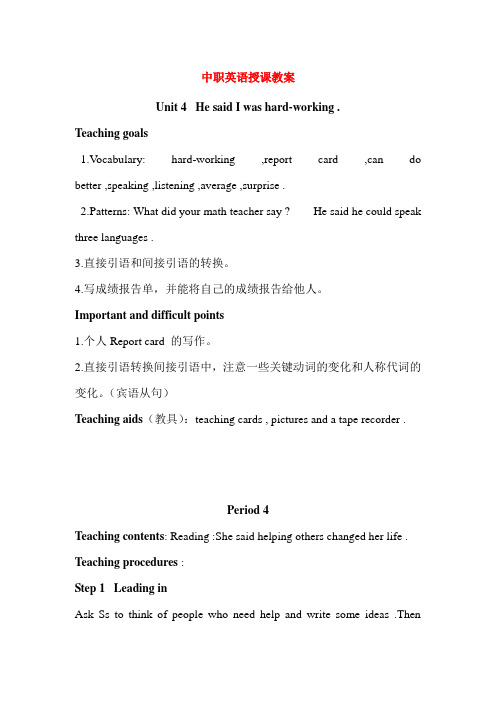
中职英语授课教案Unit 4 He said I was hard-working .Teaching goals1.V ocabulary: hard-working ,report card ,can do better ,speaking ,listening ,average ,surprise .2.Patterns: What did your math teacher say ? He said he could speak three languages .3.直接引语和间接引语的转换。
4.写成绩报告单,并能将自己的成绩报告给他人。
Important and difficult points1.个人Report card 的写作。
2.直接引语转换间接引语中,注意一些关键动词的变化和人称代词的变化。
(宾语从句)Teaching aids(教具):teaching cards , pictures and a tape recorder .Period 4Teaching contents: Reading :She said helping others changed her life . Teaching procedures :Step 1 Leading inAsk Ss to think of people who need help and write some ideas .Thendiscuss with their partner .Step 2 SB Page 32 , Section 2 .1.Have Ss read the passage first for meaning .2.Ask Ss to read it again and fill in the blanks .3.Check the answers .Step 31.SB Page 33 , Section 3 , 3a .(1).Ask Ss to read through again to find the relevant information for Yang Lei’s students .(2).Ask Ss to complete the information under “you” , saying what is true for their own lives .(3).Have Ss discuss their answers with their partner .2.SB Page 33 , Section 3 , 3b . In pairs ,ask and answer the questions .3.SB Page 33 , Section 3 , 3c .Have Ss write a summary of the reading and share the summaries in groups of five .Step 4 SB Page 33 , Section 4 .1.Have a class discussion about the work each organization does .2.Ask some Ss to say which organization they would like to work for and why .Step 5 HomeworkWrite the summary of the reading on their exercise books .教学反思:Period 5一. 单项选择。
新世纪高职高专第一册教案1-Unit (4)

Unit 4 Man and WomanTEACHING OBJECTIVES:1. Master the key words and structures;2. Be able to explain the differences between men and women with respect to the social position and the career ladder as well;3. Develop the students’ listening and speaking skills including the knowledge of phonetics (Rising Dipthongs);4. Master the grammar rules related to active and passive voices;5. Learn how to write greeting cards.TEACHING TIME: 4 periods/weekIMPORTANT POINTS:1. V ocabulary2. Some useful expressions3. Study dialogues and practice4. Rising dipthongs5.Active and passive voicesDIFFICULT POINTS:1. Text understanding2. Word Usage3. Active and passive voicesTEACHING AIDS: Blackboard, chalks, tape-recorder, CDTEACHING APPROACHES: Task Based Language Teaching, Communicative Teaching MethodTEACHING PROCEDURE:I.QuestionsIf you had a choice, would you choose to be a man or woman? Why or why not? II. Lead In1. Background information1) Bachelor’s Degrees Earned by American WomenWomen have earn ed more than half of all bachelor’s degrees every year since 1981–1982. They still trail men in certain fields but have made substantial gains since 1970 –1971.Women earn a greater proportion of bachelor’s degrees than they did 30 years ago. In 1970–1971, women earned 43 percent of all bachelor’s degrees. In 2001–2002, women were awarded 57 percent of all bachelor’s degrees. Some fields that were female-dominated in 1970–1971 remained so in 2001–2002, including health professions and related sciences, education, English language and literature/letters, and visual and performing arts. Though women earned less than half of the bachelor’s degrees in the traditionally male-dominated fields, and in 2001–2002, they have made substantial gains since 1970 –1971.II. Reading of the text1. Global readingQuestions and AnswersDirections: Skim the paragraphs for answers to the following questions.Paragraph 1:Question: What makes it difficult to understand what boys and girls show while choosing subjects?Answer: Besides genetic differences, there are many other important factors that may influence their choices.Paragraph 2:Question:What do the statistics and the report show?Answer: Although girls are equal to boys in mathematics, they have not been encouraged to do so.Paragraph 3:Question:What’s t he difference in nursery school?Answer: Only boys, not girls, are encouraged to work on their own and complete tasks.Paragraph 4:Question: What does the further report reveal?Answer: The teachers seem to give more attention to boys than girls.Paragraph 5:Question: Why do girls avoid mathematics courses?Answer: Girls avoid mathematics courses mainly for social reasons rather than being afraid of the difficulty.Paragraph 6:Question:Why don’t the teenage gir ls like to take mathematics and science up? Answer: Because girls regard mathematics and science as “masculine” subjects, they are less likely to take them up.2. Detailed readingLanguage points and the paraphrases of difficult sentences:1.anyway: ad.1) in any way or manner 不论用何种方式e.g. Get the job done anyway you can.2) in any case; at least无论如何;至少e.g.I don’t know if it was lost or stolen; anyway, it’s gone.3) nevertheless; regardless但是;不顾e.g.It was raining but they continued the Marathon anyway.e up with: find or offer (an answer, a solution, etc.)提出e.g.He couldn’t come up with an answer.3.convincing: adj. capable of causing someone to believe that something is true orreal有说服力的;令人信服的e.g. There is no convincing evidence that advertising influences total alcohol consumption.Related word:persuasiveExtended words:convince, convinced, conviction4.point out: indicate指出e.g. I will point out that his help isn’t welcome.5.influence: v. have an effect on影响e.g.The weather influences crops.n. the effect that a person has on sb.’s decisions, opinions, or behavior or the way sth. happens影响e.g.My teacher’s influence made me study science at college.Related word:affectExtended words:influential6.suggest: v.1) offer for consideration or action建议,提出,暗示e.g.The teacher suggests things for children to do.2) bring to mind by logic or association 使人想起,使人联想到e.g.The thought of summer suggests swimming.3) state sth. in an indirect way暗示e.g.That girl’s sun-tanned face suggests excellent health.Related word: advise, imply, proposeExtended words:suggestion, suggestible, suggestive7.It is … for sb. to do sth.:某人干某事……e.g.It is very good for someone to table a proposal (提出建议).8.While it is socially unacceptable for people not to be able to read and write, it isstill acceptable for women to say that they are “hopeless” at maths.Paraphrase:Although in a modern society it is unthinkable that people are unable to read or write, it seems to be acceptable for women to claim that they are very bad at maths.9.encourage: v. inspire with hope鼓励e.g.I encouraged them to work hard and to try for the examinations.Related word:inspireExtended words:encouragement, encouraging, encouraged, discourage10.The explanation for the difference, which is apparent during the teenage years, goes as far back as early childhood experiences.Paraphrase:The explanation for the difference, which is apparent during the teenage years, could be found in some of the early experiences of childhood.11.apparent: a. clearly seen or understood明显的e.g.It was apparen t to all of us that there wasn’t enough water.Extended word: apparently12.go back (to): have one’s origins in (an earlier time) 追溯至e.g.This festival goes back to the 1980s.13.on one’s own: by one’s own efforts独自地e.g.She got the job on her own.14.Interes tingly, both boys and girls tend to regard such “masculine” subjects like mathematics and science as difficult.Paraphrase:It is interesting that both boys and girls often look upon these boys’ subjects like mathematics and science as difficult.15.Most teachers who took part in the study claimed that they expect their male students to do better at mathematics and science subjects than their female students.Most teachers taking part in the study of the difference between boys and girls said that they expect their boy students to do better at mathematics and science subjects than their girl students.16.avoid: v.1) keep away from避免e.g.I crossed the street to avoid meeting him.2) keep … from happening 防止……发生e.g.We can avoid illness with rest and a balanced diet.Related word: shun, evadeExtended words: avoidable, avoidance17.take up: begin to do or learn开始从事e.g.He took up art while at school.3. Text analysisParagraphs Main Ideas1 The scientists have tried to explain the differences between men andwomen at science and maths.2 Girls are equal to boys in mathematics. Girls only stop studyingmathematics because of social attitudes.3 The differences during teenage years result from educationalattitudes in childhood.4 The teachers seem to give more attention to boys than to girls.5 Both boys and girls tend to regard subjects like mathematics andscience as difficult.6 Mathematics and science are mainly masculine subjects, so theteenage girls are less likely to take them up.To summarize the textIII. Exercises1.Let students do the exercises on pages 55-57.2.Check the exercises.3.Teacher explains important points in detail.IV. Listening and speaking1. Listening1.Give students a few minutes to read through the printed materials for eachlistening item.2.Listen to the material for the first time without looking at the book.3.Listen to the material for a second time, and ask students to try to do theexercises.4.If the class finds it a difficult job fulfilling the tasks, teacher can play therecordings third or more so that most of them can understand.5.Listen to the material for one more time with a pause after each sentence, andask students to repeat the sentence during the pause.6.Do exercises in the section.2. SpeakingUseful Expressions:What do women like most?Women really enjoy shopping.Are boys interested in football?Boys are usually crazy about it.Do men and women share the same interests?Men and women are usually keen on different things.V Grammar and Phonetics1. Grammar: Active V oice and Passive V oice1. Introduce the rules related to active voice and passive voice in grammar tips.2. Ask students to do the exercises.3. Check the answers.2. Phonetics: Rising Diphthongs ([ei] [ai] [ i] [əu] [au] )1. Invite some students to read the rising diphthongs, words and sentences.2. Play the recording.3.Tell the students the different positions of the speech organs for these sounds.4. If the class finds it an easy job fulfilling the task, play the recording once and check the students’ answers.5. If not, better play the recordings two or three times and let the students listen and repeat after the recordings.6. Ask the students to read and translate the sentences in Task III and then present the references.VI. Practical Writing1. Teach the Format of Greeting Cards卡片的写作与非正式的信件类似,首先要注明收信人的姓名,最后要有署名。
高职国际英语教案book1Unit4
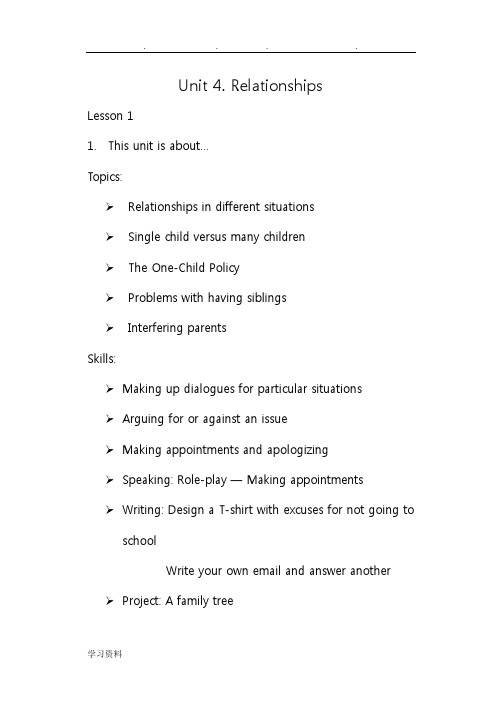
Unit 4. RelationshipsLesson 11. This unit is about…Topics:➢Relationships in different situations➢Single child versus many children➢The One-Child Policy➢Problems with having siblings➢Interfering parentsSkills:➢Making up dialogues for particular situations➢Arguing for or against an issue➢Making appointments and apologizing➢Speaking: Role-play — Making appointments➢Writing: Design a T-shirt with excuses for not going to schoolWrite your own email and answer another ➢Project: A family treeTop excuses for not going to the dentist’s Grammar:➢Adverbs:Comparison of adverbs2. Focus2.1 Match dialogues a–f to the situations 1–6.First, take a look at all the 6 situations.a. A: Why do we always have to watch what my brother andsister want to?B: Because you chose yesterday and now it is somebody else’s turn.b.A: Is this your first time here?B: No, I am a regular customer. I come every six weeks. ButI had to postpone my last appointment because my sisterwas ill.c. A: Where were you yesterday, Brian?B: I’m sorry that I couldn’t come to school but I was ill and had to stay in bed.d. A: Why did you cancel that dentist’s appointment?B: Because I hate dentists. And I thought my toothache would go away.e. A: Why do you always make dentist’s appointments for me? B: Because you never have time; when you make an appointment you forget to go.f. A: What is the problem with being an only child?B: You never have anybody to talk to or share your problems with.2.3 Now create dialogues for these three situations:1. Your friend has just cancelled a visit to the cinema with you(for the second time!).Example:A: Why have you cancelled our visit to the cinema again? B: I’m sorry. I forgot that I had to go to my grandmother’s tonight.A: But that is what you always say when you do not want to do something with me.B: That’s not true. I only say that when I want to cancel a visit to thecinema.2. Your grandfather has just told you he will give you the money for driving lessons. However, he says that you will have to drive him to the doctor’s once a week.Example:A: Okay, I will give you the money for driving lessons but you willhave to drive me to the doctor’s once a week.B: That’s okay. But I can’t go on Mondays, Wednesdays, Thursdaysand Fridays.A: And what is the problem on those days?B: In the mornings I have school and in the afternoons I have apart-time job in a supermarket.3. You are complaining in a shop that your MP3 player that you bought last week does not record. Unfortunately you have lost the receipt.Example:A: I bought this MP3 player last week and it doesn’t record. B: Can you show me your receipt, please?A: I seem to have lost my receipt.B: I’m very sorry b ut we cannot help you unless you show us thereceipt.3. Text Study (Passage A)3.1 Background InformationOne-Child PolicyOfficially the Family Planning Policy, it is the population control policy of the People’s Republic of China.Key words:•population growth rate•ethnic minorities•rural families•exception•siblings•an only childexempt fromNow, since the One-Child Policy was introduced, people have been able to and required to save money more easily.: After the One-Child Policy was issued and implemented, gradually people found that they could save up some money much more easily than before. At the same time, people alsofound that they had to save more money for their unknown future because of the One-Child Policy.3.2Words and Expressionscampaign n. 运动One-Child Policy 独生子女政策delegate n. 代表do away with remove 废除sibling n. 兄弟(或姊妹)give birth to have a baby 生孩子octuplets n. 八胞胎3.3TextDifferent countries, different families —but which is better?3.3.1Explanation of important words in details1.campaign n. a systematic course of aggressive activities for some specific purpose (社会、政治)运动,活动e.g. The candidate kicked off his campaign with a speech ontelevision.该候选人由电视演讲开始了他的竞选活动。
- 1、下载文档前请自行甄别文档内容的完整性,平台不提供额外的编辑、内容补充、找答案等附加服务。
- 2、"仅部分预览"的文档,不可在线预览部分如存在完整性等问题,可反馈申请退款(可完整预览的文档不适用该条件!)。
- 3、如文档侵犯您的权益,请联系客服反馈,我们会尽快为您处理(人工客服工作时间:9:00-18:30)。
课程名称:新世纪高职高专英语Unit 4 Who’s Afraid of Maths Anyway?授课内容:1. Understand the Text:Who’s Afraid of Maths Anyway2.Explain the key words and structures in the text.目的要求:1. Understand the differences between man and woman with respect to the socialposition and the career ladder as well.2. Master the key words and structures in the text有关记录:板书设计:Unit 4 Who’s Afraid of Maths Anyway?Lead In: Talking about the strong points and weak points of being aman or a womanMan WomanStrong Points: sense of security, opportunity tender, pretty, careful,gentle, strength, power, active tolerance, calm, prudentialhumorous, intelligence, sense warm-hearted,of responsibility , braveWeak Points: pressure, impulsive, fussy, sensibility, weak, passive, ill-tempered, crude, careless teary, nagging, unbelievingprejudiceUnit 4 Who’s Afraid of Maths Anyway?I.Lead in( 15 minutes)1. Ask the students to look at the pictures on Page 16 in the textbook and discuss in pairs if they hada choice, would they choose to be men or women, and then ask some pairs to report their findingsto the whole class.2. Ask the students to find out both strong and weak points of man and woman in relation to thevarious social parts they play, and then report to the whole class.II. Read in ( 65 minutes)1. Background Information ( 5 minutes)1)Liberal artsThe term liberal in liberal arts originally meant “appropriate for free men,” i.e., among the Romans, only freemen were permitted to pursue them. In modern times the liberal arts refer to college or university subjects such as literature, history, and political science.2)Some successful women in scienceAlthough science and mathematics are usually regarded as “masculine”subjects, many successful women in these fields proved that those subjects do not belong to men alone. For example, Marie Curie (1867-1934), a French physicist and Nobel Prize winner, working together with her husband, performed ground-breaking studies of radioactive elements, including the discovery of two such elements, radium and polonium. Their work contributed greatly to the understanding of atoms on which modern nuclear physics is based.One of the Curie’s daughter, Joliot Curie (1897-1956) shared the 1935 Nobel Prize for chemistry with her husband for their work in the synthesis if radioactive substances.Emmy Noether (1882-1935), a German mathematician, was noted for her work in abstract algebra.Her work on the theory of invariants was used by Albert Einstein in formulating some of his relativistic concepts.Marie Goeppert Mayer (1906-1972), a German-American physicist, was best known for her study of nuclear structure. She shared the 1963 Nobel Prize in physics.Dorothy Crowfoot Hodgkin (1910-1994), a British chemist and Nobel laureate, was well-known for her use of X-ray diffraction to study the structure of macromolecules. She was awarded the 1964 Nobel Prize.2. Developing vocabulary (30 minutes)1)come up with To bring forth or discover (an answer, a solution, etc.)e.g. The doctor came up with a cure for the disease.e.g. He couldn't come up with an answer.e.g. He couldn't come up with an appropriate answer just at the time.2) try: v. (1)make an effort to do 试,试图(2) taste 尝试e.g.He tried to climb the tree, but he could not.e.g.Have you tried this chocolate?3)convincing: adj. capable of causing someone to believe that something is true or reale.g.There is no convincing evidence that advertising influences total alcohol consumption.Extended words:convince, convinced, conviction4) genetic: a. of the genese.g.The scientist is investigating how genetic defects are passed on.Extended words: gene5) influence: (1) v. have an effect on(2) n. the effect that a person has on sb.’s decisions, opinions, or behavior or theway sth. happense.g. The weather influences crops.e.g. My teacher’s influence made me study science at college.Extended words: influential6) territory: n. (1) area claimed or dominated by one person or animal 领地,地盘(2) the area of knowledge(知识等的)领域,范围e.g. Wild animals will not allow other animals to enter their territory.e.g.His scientific investigations cover a wide territory.7) suggest: v.(1) offer for consideration or action 建议,提出,暗示(2) bring to mind by logic or association 使人想起,使人联想到(3) state sth. in an indirect way 暗示e.g. The teacher suggests things for children to do.e.g. The thought of summer suggests swimming.e.g. That girl’s sun-tanned face suggests excellent health.Extended words: suggestion, suggestible, suggestive8) It is … for sb. to do sth.:某人干某事……e.g. It is very good for someone to table a proposal.9) encourage: v. inspire with hopee.g. I encouraged them to work hard and to try for the examinations. Extended words: encouragement, encouraging, encouraged, discourage10) apparent: a. clearly seen or understoode.g. It was apparent to all of us that there wasn’t enough water.Extended words: apparently11) go back (to): have one’s origins in (an earlier time)e.g. This festival goes back to the 1980s.12) on one’s own: by one’s own effortse.g. She got the job on her own.13) lead: (1) show the way by going in advance 带领(2) guide or direct in a course导引,指导(3) serve as a route for 通向e.g. He led us to his home.e.g. He leads a horse by the halter.e.g. The path leads to the depths of the forest.14) evidence:n. things helpful in forming a conclusion 证据v. support by testimony证实,证明e.g. Can you show me any evidence for your statement?e.g. The police evidenced that the killer was an old woman.15) reveal:v. 1) make known揭露2) bring to view; show 使……显露;显示e.g. Research has revealed him to be a spy.e.g. The action reveals that it is a man.Extended word: revelation16) claim: v. 1) demand 要求2) state sth. as a fact 声称,宣称e.g. Did you claim on the insurance after your car accident?e.g. He claimed that he hadn’t done it, but I didn’t believe him. Extended word: disclaim17) tend: v. be disposed or inclinede.g. He tends to pitch the ball too high.18) masculine:a. relating to mene.g. The young girl has the masculine courage to dance with a bear.19) avoid:v. 1) keep away from避免2) keep … from happening 防止……发生e.g. I crossed the street to avoid meeting him.e.g. We can avoid illness with rest and a balanced diet.Extended word: avoidable, avoidance20) take up: begin to do or learn开始从事e.g. He took up art while at school.3.Detail study of the text (30 minutes)Paragraph One1) Comprehension QuestionsQ:What makes it difficult to understand what boys and girls show while choosing subjects?A:Besides genetic differences, there are many other important factors that may influence their choices.2) Main ideaThe scientists have tried to explain the differences between men and women at science and maths.3) Difficult sentences“But the difficulty is that by the time children reach school age, … or whether they‟ve been brought up to think of these subjects as boys …territory‟.”But the difficulty is that when children enter schools, there will be so many other factors influencing them that it will be very hard to tell if girls are worse at science and maths or they have been reared to consider these subjects to be boys’“field of study”.Paragraph Two1) Comprehension QuestionsQ: What do the statistics and the report show?A:Although girls are equal to boys in mathematics, they have not been encouraged to do so.2) Main ideaGirls are equal to boys in mathematics. Girls only stop studying mathematics because of social attitudes.3) Difficult sentences“While it is socially unacceptable for people not to be bale to read and write, it is still acceptable for women to say that they are “hopeless‟ at maths.”Although in a modern society it is unthinkable that people are unable to read or write, it seems to be acceptable for women to claim that they are bad at maths.Paragraph Three1) Comprehension QuestionsQ:W hat’s the difference in nursery school?A: Only boys, not girls, are encouraged to work on their own and complete tasks .2) Main ideaThe differences during teenage years result from educational attitudes in childhood.3) Sentence structureThe explanation for the difference, which is apparent during the teenage years, goes as far back as early childhood experiences.e.g. She tried to finish the painting as quickly as she could.4) Difficult sentences“The ecplanation for the difference, which is apparent during the teenage years, goes as far back as early childhood experiences.”The explanation for the differce, which is obvious during the teenage years, could be found in some of the early experiences of childhood.Paragraph Four1) Comprehension QuestionsQ: What does the further report reveal?A: The teachers seem to give more attention to boys than girls.2) Main ideaThe teachers seem to give more attention to boys than to girls.3) Difficult sentences“Most teachers who took part in the study claimed that they expect their male students to do better at mathematics and science subjects than their female students.”Most teachers taking part in the study of the differences between boys and girls said that they expect their boy students to do better at mathematics and science subjects than their girl students. Paragraph Five1) Comprehension QuestionsQ:Why do girls avoid mathematics courses?A: Girls avoid mathematics courses mainly for social reasons rather than being afraid of the difficulty.2)Main ideaBoth boys and girls tend to regard subjects like mathematics and science as difficult.3) Difficult sentences“Interestingly, both boys and girls tend to regard such “masculine” subjects like mathematics and science as difficult”It is interesting that both boys and girls often look upon these boys’ subjects like mathematics and science as difficult.Paragraph Six1)Comprehension QuestionsQ: Why don’t the teenage girls like to take mathematics and science up?A:Because girls regard mathematics and science as “masculine” subjects, they are less likely to take them up.2) Main ideaMathematics and science are mainly masculine subjects, so the teenage girls are less likely to take them up.3) Sentence structurethey are less likely to take them upbe likely to do: tend to do sth.e.g.Are you likely to be in London this year?III. Exercise ( 10 minutes)Practice Ex. IIV. Assignments1.Review the text and the key words/phrases2.Finish off Ex. II – Ex. VI3.Preview Grammar; Reading skills; Practical reading and writingV. ExpandOnline learningUnit 4 Who’s Afraid of Maths Anyway?授课内容:1. Grammar: Passive V oice2. Reading skills: Using Examples to find out the Meanings of words3. Practical Reading: Reading a Sales Ad4. Practical Writing: Greeting Cards目的要求:1. Master the use of Passive V oice2. Master the reading skill:Using Examples to find out the meanings of words3. Learn how to a Sales Ad4. Learn how to write a greeting card有关记录:板书设计:Unit 1 Who’s Afraid of Maths AnywayGrammar – Articlea. 一般现在时:be(现在式) + done He is regarded as brilliant.一般过去时:be(过去式) + done I was born in 1980.现在进行时:be(现在式) +being+ done Homework is being done by Tom.现在完成时:has +been + done This car has been driven a long way.过去完成时:had +been + done The road had been opened to traffic.一般将来时:will/shall +be+done This will be done immediately.b.情态助动词和半助动词之后的be + doneIt used to be done this way. The hair must have been cut.I.Review the text (15 minutes)1.Check the assignments2.Summarize the textSince there are too many social influences on boys and girls, scientists have found it hard to Determine the exact reasons why girls are worse at mathematics and science than boys. Nevertheless, recent reports have suggested that even from their early nursery school days, girls are not encouraged to work independently, while boys are encouraged in schools by their teachers’ expectation that they can do better than girl students. Another possible reason is that girls regard mathematics and science as difficult “masculine” subjects and avoid them, although both boys and girls think these subjects are difficult.II. Grammar Tips –Passive V oice(15 minutes)1.N ote:1)一般现在时:be(现在式) + done He is regarded as brilliant.一般过去时:be(过去式) + done I was born in 1980.现在进行时:be(现在式) +being+ done Homework is being done by Tom.现在完成时:has +been + done This car has been driven a long way.过去完成时:had +been + done The road had been opened to traffic.一般将来时:will/shall +be+done This will be done immediately.2)情态助动词和半助动词之后的be + doneIt used to be done this way. The hair must have been cut.2.Practice Ex. I and Ex. IIIII. Reading Skills (15 minutes)1. Understanding Examples2. Using Examples to Find Out the Meanings of Wordse.g. I wrote a report on the lynx and other wildcats.An animal like a wildcatAmphibians, such as frogs and snakes, are cold-blooded.↓An animal like frogs and snakes3.Answer the questions on page 62IV. Practical Reading (15 minutes)1. Read the reading material2. Practice: Ex. XII and Ex. XIIIV. Greeting Cards(20 minutes)1. Learn how to write a greeting card2) Notes of Format卡片的写作与非正式的信件类似,首先要注明收信人的姓名,最后要有署名。
